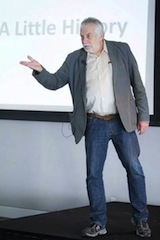Nolan Bushnell is one of the great entrepreneurs of the last 50 years. The founder of Atari revolutionized the gaming industry with one of the most successful gaming companies ever. His son Brent Bushnell is also an entrepreneur, running a company called Two Bit Circus, a purveyor of novel out-of-home entertainment.
What got my interest was their dedication to NFTE and their eagerness to work together to help an organization that is dedicated to supporting low-income youth in starting their own businesses. Both Nolan and Brent have a passion for lifelong learning and for inspiring young people to be inventors and creators.
The NFTE LA Team
The idea of a father-son team as business mentors was intriguing so, with the help of our NFTE L.A. team, I reached out to the Bushnells. This incredible father-son duo shared with me their story and values, in the hopes that more kids would benefit from the youth entrepreneurship movement.
Steve Mariotti: What did you learn when you went through your difficult period? What are three lessons learned that can be passed on to the next generation?
Nolan Bushnell: No matter how bad the bad times are, they are really much better than being in a cubicle working for 'the man.' The most important thing you have is your family and seeding the next generation. I learned about entrepreneurship from my dad and have been in the field for 60 years.
Brent Bushnell: I started as an entrepreneur when I was 10 selling mistletoe in front of the local grocery store. When I was 12, I sold so many candy bars for my baseball team they gave me a stereo. I learned that making money was just selling something for more than I paid for it. It's an interesting epiphany that can happen in a kid's life.
Nolan as the keynote speaker at the 2013 Greater LA Regional Youth Entrepreneurship Challenge
SM: Were there things that you talked to Brent about that got him started? How do you talk to young people about markets and profit?
NB: Giving kids too much money is a curse to them. You should get them to understand the difference between your money and their money.
Need is an important thing -- it exceeds their ability to earn minimum wage. Tell them there are many ways for them to make money. A big difference between many U.S. school systems and abroad is that we teach hourly concepts to low income youth, whereas globally, they teach them to own.
BB: I remember distinctly asking my father to do something and being told that "you don't have enough money to do that." I never wanted to be in that position again. For a year my brother, Tyler and I made jewelry -- the best lesson was that you encouraged us to make a quality product and on our first day we made a profit. We then invested all our profit in volume cheaper beads and sold exactly zero -- fascinating lesson on quality vs. quantity!
NB: I encouraged Brent and Tyler to get a gig, and they put together a really interesting card game, and called a guy from Topps Baseball cards who licensed it.
BB: We got $15,000 in high school. It was right at the time Kinkos was staring out. We created 3D renderings and skipped school to go to Kinkos at 3 a.m. and make deliverables for Topps.
NB: Letting kids do all-nighters when they're really passionate is key.
SM: Tell me three things you want to pass on to Brent.
NB: Face your fears and do it anyway. The act of doing is absolutely the most important thing, JUST DO IT!
When you do something, the market talks to you -- the act of doing gives you an avenue to success. Don't hold back, over think or over plan.
BB: I remember him saying that no battle plan survives engagement with the enemy.
SM: In my experience, planning is invaluable. If someone has $100, a lot depends on not losing it, if they go into the battle/marketplace and don't know their unit, they get confused and sell below their Economics of 1 Unit, must understand comparative advantage -- there is room for both thoughts
NB: I'm a big planner, but I like to have my plans written in water.
BB: The planning stage is an active and engaged process. You want to be engaged and incorporate new data as fast as possible.
Transform L.A. Youth Entrepreneurship Conference
SM: How do we explain what went wrong in the 80s? What's the lesson?
NB: I believe that 100 percent of my problems came from personal hubris -- I had too many successes too easily, too early and got sloppy. Dad used to say, "Just the minute that you think the sun shines out of your ass, all you have is an illuminated landing area." The lesson is to always be humble, but not too humble. Humility actually doesn't inspire confidence. A leader needs to have a certain amount of hubris; you always have to be humble in your own beliefs about the infallibility of your decisions and recheck them -- be willing to change your mind.
SM: What advice can you give on the precarious situation with the use of debt?
NB: Beware of bankers offering gifts. You have to understand very clearly who's the entrepreneur and who's taking risks and who isn't, and understand that when you build things with debt, you really have to be able to pay it back.
It's an interesting question -- I got into trouble in 1984. The same guys that were lending me money were the ones who promised me they would take it out. I believed them and they screwed me. Shame on me.
SM: You're now in the education space and have had a huge home run. What are you guys doing now?
NB: We have a technology (Brain Rush) that is literally teaching kids 10 times faster in a variety of subjects. Think of it as Wikipedia meets Zynga -- free and crowd sourced -- teachers building lessons. We're building the engines that make it very easy for them to create a lesson -- we're using brain science that helps them to change the velocity of retention and understanding and knowledge. We like to say, imagine four years of high school crammed into six months. We've got the solution and it's now just a matter of deploying it.
My previous venture, uWink was a high-tech restaurant solution with touch screens on the tables and projectors on the walls. Guests could browse and order directly from the table and then play games against the whole restaurant. It was a lot of fun, but we were just too early.
BB: It was crazy because we proved all the things we set out to -- the automation reduced restaurant labor costs, the software created higher check averages, and there was increased revenue from games -- but technology just wasn't there yet. We scoured the globe for a $1,000 tablet a few years before the iPad came out.
SM: Any Brain Rush sales yet?
NB: No, we are pre-revenue, but we have great venture capital partners and everyone is right on track of where we expected to be. We were adopted by several school districts and foreign language teachers, and are ahead of plan at this point.
SM: How many startups have you done and how many home runs?
NB: Twenty-two to 23 companies. Six home runs out of 23 -- Atari, Chuck E. Cheese, Etak, Axlon, By Video, Magnum Microwave -- I've only lost money in five of them.
SM: Six home runs, two that changed the world, four that were profitable, four financial failures. How do you value something's worth in the future?
NB: An option market -- I ask myself, based on all the knowledge that we have right now, can I present that in a way where someone else will invest at that level.
An awful lot of valuation is based on what I can sell it for in the future. For example, I get a big uplift because I know that all the big textbook publishing guys will need good software solutions within a few years and they will bid up people who have good online presence. Pearson is on our short list. I've got a couple of things for them and Brent has done some work with them.
The teaching that there is a valuation of something in the future is the whole ball game because a lot of poverty is high time preference which means I have to get the reward right now -- inability to wait and to save, essentially, to survive and grow a cash flow.
Future valuation is crucial to activating the part of the brain in a child that says, "If you do this now, there's a chance that your life will be better a year from now," -- generic consciousness raising about ownership and time.
Remember Hesse's book Siddhartha? One of the skills of the protagonist was to fast, which, in some ways was a metaphor for doing without today so that you can build a capability for other things. I think that fasting, metaphorically, is an important skill, i.e., the story of the businessman who sleeps under his desk until he can afford an apartment -- the whole idea of the lean startup is the ultimate in fasting.
SM: My worry is that with Keynesian Economics, we've taught young people not to save and that spending is wealth, and I don't think it is.
NB: Definitely not. Atari was totally self-funded. We put in $500 and everything else we did was basically vendor financing. We learned how to turn an inventory fast enough that the terms that we got from our vendors was enough to allow us to grow. Not a penny of venture capital until we were $20 to $30 million in sales in 1970.
SM: You were 27 when you founded Atari. How many people do you think have been affected by Atari? Billions?
NB: In some ways, I believe the video game would have happened regardless, in 1977 to 1978, subsequent to ubiquity and microprocessors. What my technology really allowed was to do video games before the microprocessor, cheaply and easily, when actually, chips didn't want to go that fast -- the days when the fastest computers were running at 500 kilohertz.
The thing that's so special now is we can basically go from idea to prototype in an afternoon -- the software and hardware solutions are getting so good.



